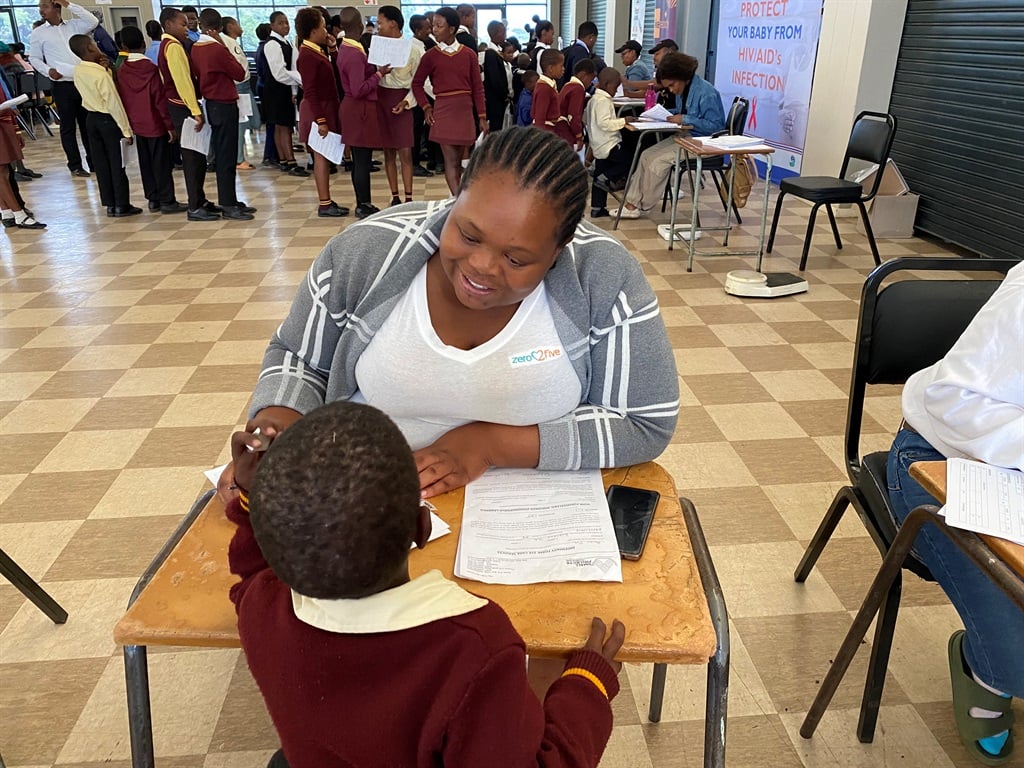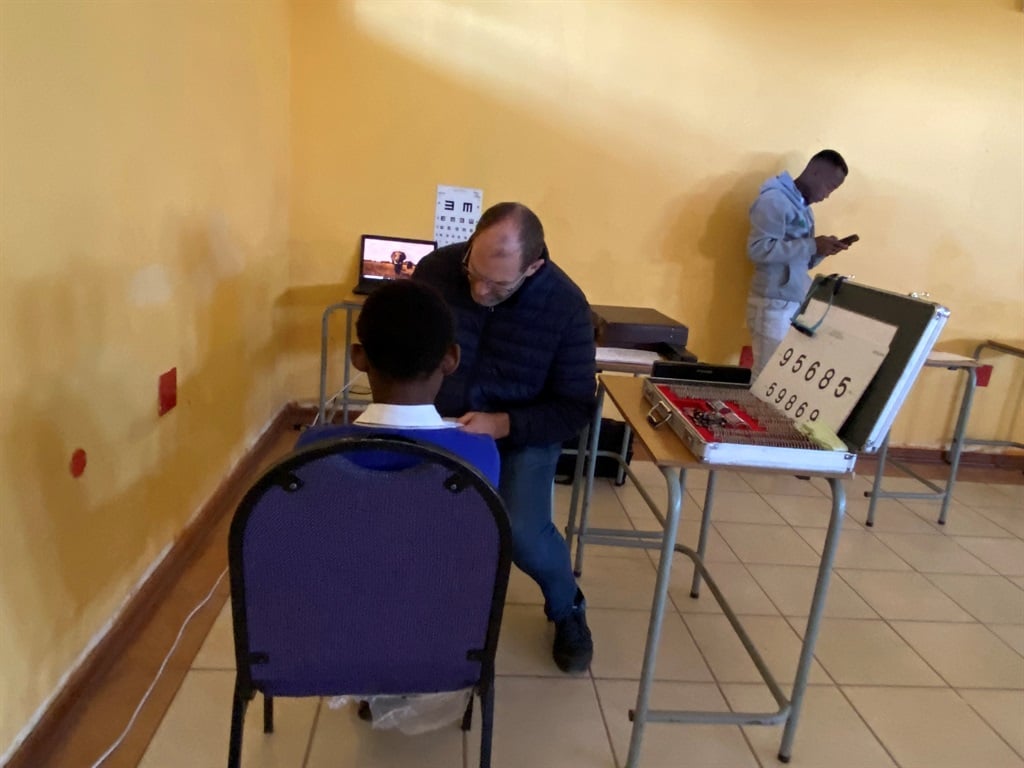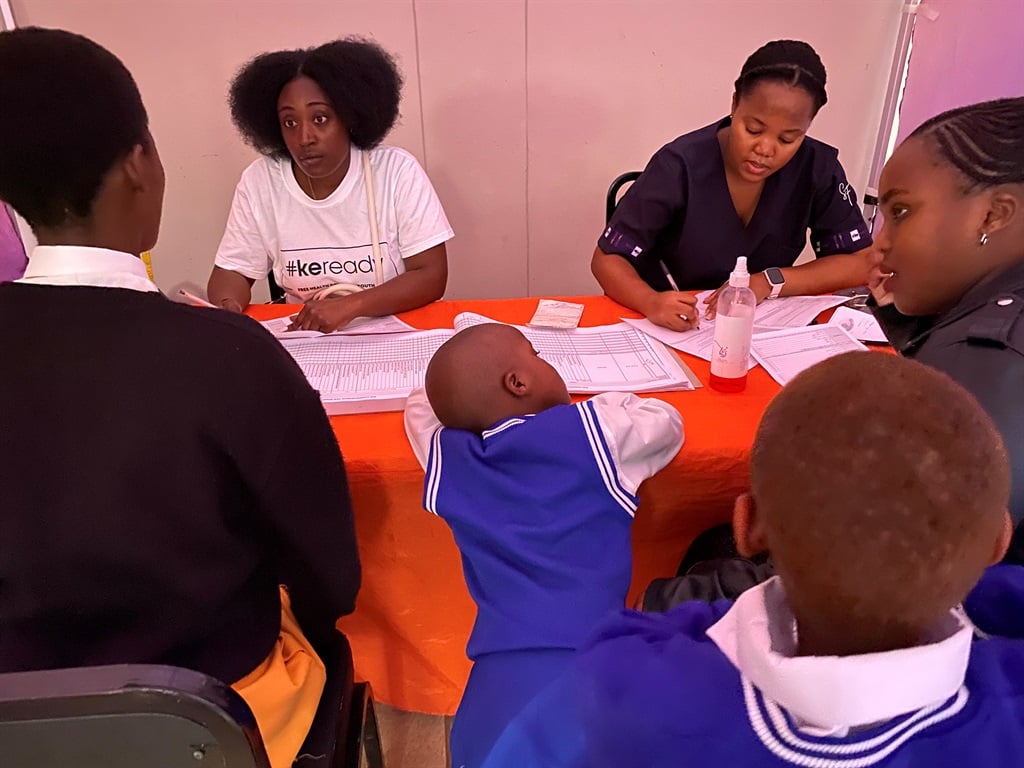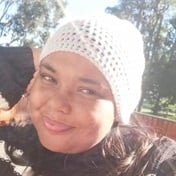Subscribers can listen to this article

Children lining up to see the dentist at the Ekuphumleni Community Hall, near Whittlesea. (Sue Segar/Spotlight)
The Keready project uses mobile clinics to take healthcare services to rural areas.President Cyril Ramaphosa described the movement as “NHI on wheels” because of its efforts in addressing universal health coverage. Keready recently took eye, dental, and other healthcare services to communities in the Eastern Cape.
In the small Eastern Cape town of Bizana, hundreds of children stream into a large hall at the Oliver and Adelaide Tambo Regional Hospital on a brisk Tuesday morning in May. There’s a festive but orderly vibrancy in the air – the scene made all the more colourful by different school uniforms and young voices from tiny six-year-olds to learners in their late teens.
They’ll be assessed, and helped by doctors from Keready – an organisation offering mobile health services in many far-flung communities lacking healthcare services.
For weeks leading up to today, outreach teams from Keready’s mobile clinic operation have gone from school to school, asking teachers to identify children with eye problems.
Today they arrived on various forms of transport – some on the back of a bakkie – from deeply rural communities as far as 100km away. Most of the children have little access to health services, particularly eye care, so the response is substantial.
READ | Will the new Eastern Cape govt return the 24/7 health centre to the people of Ngcobo?
I have travelled here with three doctors and an admin assistant from Keready’s East London office. They join other healthcare staff, including from the health department, for this two-day mega outreach in partnership with the Umbono Eye Project.
“Over the past three months, school educators identified 492 learners from 26 schools who have impaired vision,” says Ewan Harris, a pharmacist and consultant by training and a former deputy director-general of education in the Eastern Cape, who heads up Keready’s Eastern Cape team.
“We will attend to these learners and if necessary, provide them with prescription spectacles and meds.”
Ntombizedumo Bhekizulu, a teacher at the Mhlabuvelile Senior Primary School at Ludeke Mission, has come with 16 children, “the ones who struggle to see what we write on the chalkboard”.
Bulelwa Mqhayi from Nomathebe Primary School in Isithukuthezi adds: “It’s great that they can help these kids. Most of the parents are unemployed and on social grants and don’t have the money to take the kids to specialists. The clinics don’t help us with eye problems.”
The youngsters will also have a range of other health checks and will be sent to see one of the doctors on site if found to be in need of further health assistance. The health department has deployed a mobile dental unit, an audiologist, as well as a medic to provide advice on family planning and reproductive health.

A child being signed in for a health check at Bizana. (Sue Segar/Spotlight)
Before arriving at the registration desk, the children have already been given deworming tablets and a Vitamin A supplement, provided by the health department, while each group is given a health talk on age-dependent topics ranging from hand hygiene, to TB and HIV.
After handing in their registration and consent forms, the children go through basic vision screening tests by a team of “eye care ambassadors” – young people supported with employment opportunities through the Social Employment Fund, which is managed by the Industrial Development Corporation.
If the school children fail the eye screening test, they are sent to see optometrist Johan van der Merwe.
In between patients, he tells Spotlight he’s already found a number of “low vision candidates” and one who might need to be placed in a special school.
“I’ve just done a full refraction on one child … It’s clear that he has a lens defect,” says Van der Merwe.
Placing his hand on the head of another small boy, he continues: “This little one has been very quiet … he’s struggling to communicate. He needs thick lenses, or an operation by a specialist.”
Van der Merwe, who has been an optometrist for 22 years, joined the Umbono Eye Project permanently almost two years ago after volunteering his services once a week.
He added:
Before I joined, I was working in a mall in East London. I never saw sunlight.
He adds: “It has been very rewarding to make a difference to these children.”
At another mobile site, health department dentist, Dr Unathi Mponco, has been busy with youngsters suffering from a range of dental ailments.
“There were sore teeth, rotten teeth, mobile teeth, and some children had very swollen gums…. Whatever I can treat on the mobile truck, I deal with here – otherwise if they need X-rays or the cases are more serious, I refer them to the hospital’s dental unit for a comprehensive exam,” she says.
In a mobile van outside the hall, health department medic Siyabonga Chonco has been consulting teenage girls all day offering family planning services.

Optometrist Johan van der Merwe assesses a child at Bizana. (Sue Segar/Spotlight)
“The Alfred Nzo district has the highest rate of teen pregnancies in the Eastern Cape. We are trying hard to curb teenage pregnancy,” he says.
The teens are invited to ask any questions and to say whether they are sexually active and ready to take contraceptives.
Chonco says in almost every case, he senses great relief from the learners to speak to an impartial young person.
“They tell me that, at the clinics, the older nurses can be quite harsh… They open up to me, especially with questions about contraceptives.”
He says broadly, young people are interested in long-term contraceptives.
WATCH | Looking back to look ahead: Here’s what SA’s former health ombud says
“They don’t want to have to go to clinics all the time.”
Some will walk away with a contraceptive implant – a flexible plastic rod about the size of a matchstick that is placed under the skin of the upper arm to prevent pregnancy over three years – while others will choose injectables or pills.
At the end of two days in Bizana, the team has seen nearly 750 youngsters from about 40 schools, with 432 having had their eyes screened and 52 eligible for specs.
For six of those children, the spectacles will be life-changing, says Van der Merwe.

Doctors Eileen Kaba and Anda Gxolo consulting with their little patients. (Sue Segar/Spotlight)
Apart from a few “high” prescriptions that might have to be ordered from overseas, a member of the team will deliver the specs personally to each learner, an occasion which is a highlight for the team.
“When we first put the glasses on their faces, you just see smiles. The parents are so thankful. It makes this so worthwhile,” says Van der Merwe.
Keready is working closely with the provincial departments of health and education. The NGO recently received the Eastern Cape’s Batho Pele Award for enhancing healthcare in the province.
“We could never reach all these children as government,” says TD Mafumbatha, mayor of the Winnie Madikizela-Mandela municipality, adding, “this is what collaboration looks like”.
But where did it all begin?
Keready, loosely translated as “We are ready”, was set up in February 2022 to encourage young people to vaccinate against Covid-19.
One of the people behind Keready is Harris, a pharmacist and consultant by training and a former deputy director-general of education in the Eastern Cape.
Harris was working as a consultant for the Fort Hare Institute of Health, when he was asked to help design the Eastern Cape’s Covid vaccine rollout strategy.
He said:
The Covid programme was a success because, through advanced digitisation, we were able to map the 84 000 communities in South Africa to their nearest schools, clinics and hospitals.
And it is out of that awareness of the spatial distribution of healthcare needs that Keready was born.
After the Covid programme ended, Harris, as national lead for the project, was tasked with setting up Keready’s offices in four provinces, including employing provincial leads, and staff as well as doctors and nurses.
“Our vision was to give young doctors the opportunity to manage at the highest level, under our guidance.”
Implemented by DG Murray Trust (a South African philanthropic foundation) in partnership with the national Department of Health, Keready is funded by the German government through the KfW Development Bank.
The project reached full scale late last year, with 46 mobile health clinics in four provinces: Eastern Cape (8), Gauteng (16), KwaZulu-Natal (13), and the Western Cape (9).
These mobile clinics move into different communities every day. At times they use a loud-hailer to attract people. Sometimes they are based at schools, other times at taxi ranks and other hubs of activity.
ANALYSIS | A new law on healthcare will not change things for the better: What NHI will not fix
People of all ages who visit the clinics are provided with a range of health services, including screenings and tests for HIV, TB and diabetes, as well as given family planning advice and immunisations. Medication is prescribed, and, where possible, dispensed on the spot.
Keready also runs a WhatsApp line where youth can ask young doctors and nurses any health-related questions and get straightforward, non-judgmental answers.
When learning about Keready during a walkthrough of exhibition stands set up at the Birchwood Hotel in Boksburg during the 2023 Presidential Health Summit, President Cyril Ramaphosa described the movement as “NHI on wheels” because of its efforts in addressing universal health coverage.
From Bizana to Whittlesea
Two weeks later, I am again travelling with the same Keready team – this time to Whittlesea, outside Queenstown.
Over two days, we visit the Ekuphumleni Community Hall and Kopana School in Ntabethemba. A highlight of this outreach is that teenage girls will be supplied with sanitary pads, thanks to a collaboration with pharmaceutical and healthcare company Johnson & Johnson.
On day one, hundreds more pupils than anticipated arrive. School principals were over-enthusiastic in spreading the word of the outreach, resulting in taxi-loads of pupils from unexpected schools arriving. Irate teachers try to negotiate a way for their pupils to be seen.
Teacher Nolitha Tuta tells me many of the children she’s brought are from child-headed households and some have had little to no access to healthcare services.
While waiting in the queue, a mother of a child from Bhongolethu Primary School describes how she walked for hours to bring her child for eye testing.
Despite having waited until the end of the day, students from Zweledinga High end up being driven back home at sunset without being assisted.
READ | Defending NHI: An ‘opportunity to access quality healthcare’ – outgoing chair of health committee
After two days in Whittlesea, nearly 1 200 pupils from 36 schools have arrived. Nine schools were turned away. Nearly 700 learners have been screened for eye conditions, with 88 eligible for specs and four referred to an ophthalmologist.
The doctors look exhausted. Dr Anda Gxolo says over the past two days, numerous children presented with ear problems. There were also long lines for dental care this time.
Despite the long hours, Dr Phumelela Sambumbu, who manages five of the eight Keready mobile clinics in the Eastern Cape, says she loves her work.
“I come from these parts – from a village between Cofimvaba and Tsomo. My old grandmother is bedridden. I know first-hand how difficult it is to have access to care when you’re from a village like that and when you suffer from ailments like that. The idea of bringing health services to people who would otherwise struggle to access them is what drives me,” she says.
Mapping the need
Based on its relationship with the department of health, Keready has ambitious plans to expand its grassroots outreach programmes to help narrow the gaps in healthcare nationally.
A map on the wall of Keready’s office shows the number of government clinics in the Eastern Cape relative to schools. There are around 700 clinics in the province, but over 500 schools (which works out to more than seven schools per clinic). Nationally, the ratio is similar, with around 3 400 clinics and 25 000 schools.
It’s no surprise then that, according to Harris, staff on Keready’s 46 mobile clinics in the four provinces where it operates cannot keep up with demand for their services.
“Based on our mapping of the national population, we know there are 2 500 communities that don’t have reasonable access to a clinic. Just to deal with the gaps, we need 2 500 mobile clinics. We can tell you exactly where in the country to put them,” says Harris.
READ | Prosecuting doctors in SA: When is a mistake more than just a mistake?
To reach ill people who are ill but don’t know it, Keready aims for nurse-supervised ambassadors to do door-to-door visits in communities to check who has TB, HIV and hypertension.
“We have digitised every street and every house by satellite. Each house would be marked off; if TB’s picked up, it is mapped,” says Harris.
Plans for the door-to-door programme are well under way, he says.
“In the Eastern Cape, Keready has partnered with the Small Projects Foundation to train 80 young people [as nurse-supervised ambassadors] from the Industrial Development Corporation’s Social Employment Fund to do health testing house to house.”
Eventually, says Harris, there could be 80 people linked to each of the 46 mobile clinics, meaning that a total of 3 680 trained people could be going from door to door.
“Going forward, we’d want to find the disease before the disease finds us – TB, HIV, hypertension, diabetes and general growth issues [in children] are the core areas we will address in this programme,” he says.
But the extent to which Keready can deliver on its ambitious expansion plans will depend on funding and to what extent government continues to implement services using mobile clinic outreach programmes.
The German financial contribution to the Keready project comes to an end in September.
“We are working day and night to get more funding,” says Harris. He says they will soon be meeting with potential donors.
We live in a world where facts and fiction get blurred
Who we choose to trust can have a profound impact on our lives. Join thousands of devoted South Africans who look to News24 to bring them news they can trust every day. As we celebrate 25 years, become a News24 subscriber as we strive to keep you informed, inspired and empowered.
Next on News24
Lymphoedema patient fights to get better to fulfil biggest dream: adopting a little boy
13 Jul

Show Comments ()
>>> Read full article>>>
Copyright for syndicated content belongs to the linked Source : News24 – https://www.news24.com/news24/southafrica/news/how-nhi-on-wheels-is-bringing-life-changing-healthcare-to-young-people-in-rural-eastern-cape-20240713











